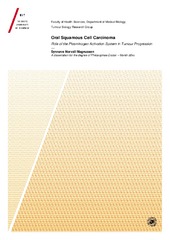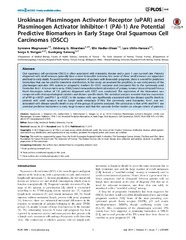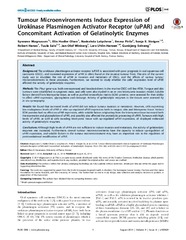| dc.contributor.advisor | Svineng, Gunbjørg | |
| dc.contributor.author | Magnussen, Synnøve | |
| dc.date.accessioned | 2015-01-21T13:32:58Z | |
| dc.date.available | 2015-01-21T13:32:58Z | |
| dc.date.issued | 2015-01-30 | |
| dc.description.abstract | Oral squamous cell carcinoma (OSCC) is an aggressive and unpredictable cancer with a high tendency to recur and metastasise. Despite increasing efforts to improved treatment, the 5-year survival rate is still low. We discovered that low expression levels of the urokinase plasminogen activator receptor (uPAR) and the plasminogen activator inhibitor-1 (PAI-1) two proteins normally involved in the process of wound healing, were associated with low disease specific death in patients with early stage OSCC. PAI-1 and uPAR were therefore suggested as potential biomarkers to aid clinicians in treatment stratification. High expression of uPAR and PAI-1 was therefore implicated in the early stages of OSCC progression. In vivo studies further showed that the tumour microenvironment was involved in the induction of uPAR expression, which simultaneously resulted in enhanced activity of gelatinolytic enzymes. In vivo tumour growth in a syngeneic mouse model of OSCC did not show metastasis, however the tumour growth pattern reflected that of early stage OSCC. uPAR locates the proteolytic enzyme urokinase plasminogen activator (uPA) to the cell surface of cancer cells, and such pericellular proteolysis is thought to be required for cancer cell invasion and metastasise to distant organs. Cleavage of uPAR terminates its ability to bind uPA, however gives cells a different set of functions. These include directional migration which is also needed for cancer cells to spread. We could show that the stromal derived factor transforming growth factor-β1 (TGF-β1) up-regulated the expression of PAI-1, and furthermore down-regulated cleavage of uPAR. Taken together, the current study shows that uPAR and PAI-1 are involved in early stage of OSCC progression, and that factors in the tumour microenvironment are important regulators of both the expression and posttranslational modifications such as glycosylation and proteolytic cleavage. | en |
| dc.description.doctoraltype | ph.d. | en |
| dc.description.popularabstract | Flere enzymsystemer har vært vist å være involvert i de tidlige stadiene i spredning av kreft. I dette prosjektet har vi sett på plasminogen aktivator systemet. Gjennom prosjektet har det blitt avdekket at også kreftceller i munnhulen kan benytte seg av dette enzymsystemet til spredning. Gjennom modeller som simulerer spredning av kreft, har det vært vist at disse systemene er viktige ledd i utviklingen av mer ondartede stadier av kreften. Det ble også vist at vevet som omslutter kreftsvulsten spiller en rolle i denne utviklingen. Ved å studere pasientprøver ble det avdekket at pasienter i tidlige stadier av kreften, og som samtidig viste lave verdier for enzymsystemet, hadde gode prognoser. | en |
| dc.description.sponsorship | The current work was funded by UiT, and grants from the Norwegian Cancer Society, the Erna and Olav Aakre Foundation and The North Norwegian Regional Health Authorities (HelseNord). | en |
| dc.description | Paper III of this thesis is not available in Munin:<br> III.Magnussen S, Hadler-Olsen E, Jacobsen C, Berg E, Winberg J-O, Uhlin-Hansen L, Svineng G. Transforming Growth Factor – β1 (TGF-β1) Regulates Cleavage of the Urokinase Plasminogen Activator Receptor (uPAR) through Increased Expression of Plasminogen Activator Inhibitor -1 (PAI-1). (Manuscript). | en |
| dc.identifier.uri | https://hdl.handle.net/10037/7038 | |
| dc.identifier.urn | URN:NBN:no-uit_munin_6622 | |
| dc.language.iso | eng | en |
| dc.publisher | UiT The Arctic University of Norway | en |
| dc.publisher | UiT Norges arktiske universitet | en |
| dc.rights.accessRights | openAccess | |
| dc.rights.holder | Copyright 2015 The Author(s) | |
| dc.rights.uri | https://creativecommons.org/licenses/by-nc-sa/3.0 | en_US |
| dc.rights | Attribution-NonCommercial-ShareAlike 3.0 Unported (CC BY-NC-SA 3.0) | en_US |
| dc.subject | VDP::Medisinske Fag: 700::Basale medisinske, odontologiske og veterinærmedisinske fag: 710::Medisinsk molekylærbiologi: 711 | en |
| dc.subject | VDP::Medical disciplines: 700::Basic medical, dental and veterinary science disciplines: 710::Medical molecular biology: 711 | en |
| dc.title | Oral Squamous Cell Carcinoma - Role of the Plasminogen Activation System in Tumour Progression. | en |
| dc.type | Doctoral thesis | en |
| dc.type | Doktorgradsavhandling | en |


 English
English norsk
norsk


